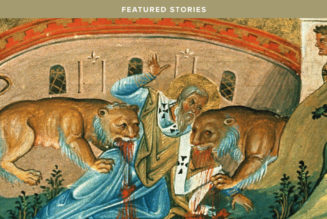
“Religion that is pure and undefiled before God and the Father is this:” St. James says in the Second Reading. Then he fills in the blank.
But how would we fill in the blank if we didn’t have this reading?
After five weeks of Gospel readings from John 6, the Eucharistic discourse of Jesus, the Church offers an important qualification in the readings for the 22nd Sunday in Ordinary Time Year B.
After five weeks of emphasis on the ritual communion we achieve with Jesus Christ’s real presence in the Mass, the Church wants to make clear that it isn’t ritual that saves us. But more on that in a second. First, let’s look at what religion that is “pure and undefiled before God and the Father” is not.
For one thing, pure religion is not getting so caught up in the externals of ritual that you lose the meaning.
In the Gospel reading from Mark, Chapter 7, the Pharisees notice that some of Jesus’s close followers eat without first washing their hands. They confront Jesus, asking, “Why do your disciples not follow the tradition of the elders but instead eat a meal with unclean hands?”
Mark gives the backstory. “Keeping the tradition of the elders,” he says, the Pharisees “on coming from the marketplace … do not eat without purifying themselves.”
It’s important to note that they are showing fidelity here not to the Law, but to the “tradition of the elders” — additions to the Law. And the detail about the marketplace is telling also. Mark is brilliantly describing what “virtue signaling” is at its heart: It is a desire to repudiate the unenlightened rabble and show ourselves to be their superiors.
Jesus goes on to criticize the Pharisees not because they care about religious details, but because they have made up their own religious details to care about. “You disregard God’s commandment but cling to human tradition,” he complains.
Then Jesus gives a very telling account of what they should care about.
Turning aside from the Pharisees, Jesus summoned a crowd to declare, “Hear me, all of you, and understand. Nothing that enters a man from outside can defile that person; but the things that come out from within are what defile.”
Then comes a remarkable list from the Son of God himself of sins that come “From within people, from their hearts.” The list is every bit as relevant to Americans today as it was to ancient Israel.
- Evil thoughts, Jesus says, and in America and across the West, the loss of the sense of sin is the greatest evil facing Christians and society in general, killing consciences and birthing all kinds of wrongdoing.
- Murder, Jesus says, and America is experiencing a suicide epidemic and the killing of unborn children is so accepted that the presidential candidates for both parties have pledged to protect abortion.
- Adultery, Jesus says, and the abandonment of families by fathers is the leading cause of poverty in America.
- Theft and greed, Jesus says, and America’s consumerist economy enslaves us to Mammon and traps the poor in crushing debt, while preventing us from almsgiving that could help.
- Unchastity, malice, deceit and licentiousness, Jesus says, and by far the most lucrative media in America is pornography, created by an industry that relies on malice and deceit to exist, on the part of both its customers and its producers, who exploit performers in many ways, including human trafficking.
- Envy, Jesus says, and hatred has taken over our public discourse such that we reject friends and family if they are our political opponents and consider those who disagree with us bigots or moral monsters.
- Blasphemy, Jesus says and our culture thinks nothing of mocking God, from caustic cartoons to the opening ceremonies of the Olympics.
- Arrogance, Jesus says, and our radically individualistic philosophy of self-invention has left generations more confused, lonely and unable to form attachments than any before.
- Folly Jesus says in the end, summing us up in a word.
“All these evils come from within, and they defile,” he says. How did it get this bad? The same way it did for the Pharisees — little by little.
We were not always like this, and the Pharisees were not always like that either.
The Pharisees started out as leaders of a Jewish renewal, dedicating themselves to the Law and allowing it to pervade their whole lives. Their hypocrisies likely started small and built over time, until they were so distant from God that when Jesus Christ came, fulfilling the Scriptures, they colluded in his death.
In the same way, the United States started out as a nation built on a people dedicated to virtue. As the U.S. bishops said in 1893:
“We consider the establishment of our country’s independence, the shaping of its liberties and laws as a work of special Providence, its framers ‘building wiser than they knew,’ the Almighty’s hand guiding them,” said the Baltimore Council of U.S. bishops. “And if ever the glorious fabric is subverted or impaired it will be by men forgetful of the sacrifices of the heroes that reared it, the virtues that cemented it and the principles upon which it rests.”
But like the Pharisees, over time we “disregarded God’s commandment to cling to human traditions.” It started with quiet compromises, giving an inch here and an inch there, honoring God with our lips while our hearts strayed far from him.
But as Archbishop Charles Chaput is often quoted saying, “Evil preaches tolerance until it is dominant, then it tries to silence the good.” We started out tolerating sin and now we require it. We changed the definition of marriage, then changed the definition of gender; we tolerated sexual excess, allowing it to stream unfiltered on the Internet everywhere, and now it is pushed on our children by schools, libraries and booksellers. St. John Paul II was prophetic when he said, “Families will be the first victims of the evils that they have done no more than note with indifference.”
And don’t miss another lesson of Sunday’s Gospel: The Pharisees call out Jesus, in public, as a fraud based on the way some of his disciples behaved. The same thing is true today: What some Christians do is assumed to be what Jesus would do.
That can work for us or against us, Moses says in the First Reading.
In the First Reading, God says of his commandments: “Observe them carefully, for thus will you give evidence of your wisdom and intelligence to the nations.”
If we know and follow smart laws, we look smart like God. If we don’t, we look stupid, and people learn to ignore him and us. There are two ways to be “stupid” regarding God’s law. One is to “underthink” it — to try to max out our personal comfort while giving God the minimum possible. Another is to “overthink” it, and live a life of external religiosity while staying far from God interiorly. Both are folly.
Moses commands simplicity in Sunday’s first reading: “In your observance of the commandments of the Lord your God, which I enjoin upon you, you shall not add to what I command you nor subtract from it.”
But that brings us back to that opening fill-in-the-blank exercise: “Religion that is pure and undefiled before God and the Father is ….” what?
The answer James provides is that true religion is “to care for orphans and widows in their affliction and to keep oneself unstained by the world.”
Notice there are two aspects to the answer, and both are necessary.
First, pure religion means we have to actually care for the people God has placed in our power to help. Saying a Divine Mercy chaplet is great, but adding an act of human mercy is also necessary. Praying is vital, but so is service.
Second, we need to never forget the admonition to keep ourselves “unstained by the world.”
The world stains our minds and hearts if we only expose ourselves to the articles, stories, music and media that think like the world does. Without solid spiritual reading — and stories, and even music — it is hard to stay in touch with God’s way of thinking. Just as spouses who live hundreds of miles apart endanger their marriage, if we spend all of our time apart from Jesus Christ, we will lose him, too.
Talking to our spouse on the phone, and talking to Jesus in prayer, is necessary but not enough. We have to share our lives with him: “Be doers of the word and not hearers only, deluding yourselves,” St. James says.
It’s a good reminder that the doctrine of the Real Presence of Jesus in the Eucharist is not ultimately about ritual. The true fruits of Holy Communion are the ways it configures our lives to Jesus Christ so that he can do his work in the world, using us as his instruments.
Image: Pexels, Mikhail Nilov








